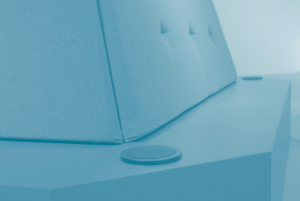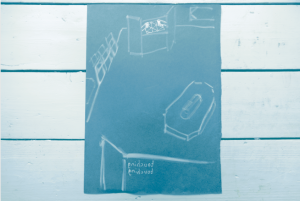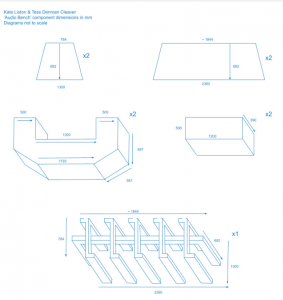Kate Liston
Notes on Audio Bench as Baggage
I spent the second half of 2021, after social distancing had been relaxed in England, planning a project: the tour of a large sculptural bench around the British Isles. I was hung up on by a haulage company as I attempted to explain the intended stages of the route from Gateshead to North Uist to the Isle of Man. The bench — although modular and, as my carefully drawn section plans illustrated, able to fit comfortably within a Luton van — was, in hindsight, quite a ridiculous object to attempt to take on such a tour. It was perhaps also born out of the kind of expansive speculative thinking certain experiences of Covid-19 lockdown made possible.

‘Audio Bench Tour’ or ‘Wapentake Artist Publishing Tour’ was a collaborative project by artist Tess Denman-Cleaver and me which never came to be. It developed out of our exhibition ‘Town Hall Meeting of the Air’ held at BALTIC39, Newcastle upon Tyne in the summer of 2021.
‘Town Hall Meeting of the Air’ was an installation including our collaborative work as well as that of invited artists, a hosting space for live events, and the site of a live and prerecorded internet radio broadcast.
[…..]
Some ways Tess and I have spoken about ‘Audio Bench Tour’ are:
[…..]
It was me who pushed for us to store the audio bench after the ‘Town Hall Meeting of the Air’ exhibition closed. I was confident at the time that we wouldn’t need more than the two months at half price Armadillo Storage Gateshead gave as an introductory offer, because we would find somewhere to tour the object. It was me who excitedly completed the paperwork and received the sectioned-up object at the unit. It was Tess who in February 2022, after our two unsuccessful funding applications, oversaw the sculpture’s removal and delivery to the local recycling centre.
[…..]
I was in the early stages of pregnancy when we were planning ‘Audio Bench Tour’. I had taken joy in imagining touring islands with the baby strapped to my chest. By the time we destroyed the sculpture I was heavy and tired. On a research trip to Isle of Man in March 2022 to explore the island and think about a benchless version of the project, I had to keep asking Tess to slow down because I was out of breath.
When C was born five weeks prematurely in early April, I had to cancel several other projects I was aiming to wrap up in the exactly five weeks of leave I had booked in before the due date. When I explained these commitments to a midwife on a home visit and mooted out loud the potential of still delivering one or two, she told me I had to take all of them, put them in a box, and lock it. She gestured turning a key as she said this.
I imagine that holding onto the potential of these projects was not what she meant. Had she continued, she may have advised me to take the locked box and bury it, or throw it away, store it in an attic or give it away. What I did instead, alongside the myriad epically scaled emotions, activities and responsibilities of caring for an infant, was to keep the box, metaphorically on my lap. Work-wise, maternity leave felt like a holding pattern.
[…..]
At work (in my permanent, part-time role as an Assistant Professor in Fine Art at Northumbria University) I recently described to a colleague the stress of holding information in my head, usually during email-related tasks, without being able to immediately put it to use. I aligned this with the low-grade anxiety I feel when I CTR-C and get distracted before I can CTR-V in a Word document. You’re using too much RAM, he said, and I understood in a new way my ADHD-related diagnosis of ‘poor working memory’.
My ADHD diagnosis is recent. I am the ‘inattentive’ kind, rather than the ‘hyperactive’ kind, although I do think the metrics on this are skewed as my gendered experiences have, I feel, pushed my hyperactivity inwards, making it less visible — but that is for another article. Inattention implies a lack of noticing. I experience it as too much. I see connections everywhere. I get an involuntary surge of adrenaline when I see the words OPEN CALL and am once again astonished at the uncanny relevance of the artist brief to my current work. New opportunities are my catnip.

Or I could argue that years of applying for artist residencies, exhibitions and funding have trained me for this. It is difficult to untangle what is a cognitive bias or disordered magnetism towards the next exciting thing, and what is intrinsic to the structures of lived life.
[…..]
The term mental load describes the experience of parents having to remember a child’s schedule (social, extra-curricular, medical), the names of classmates and teachers, the running times of play cafes, children’s centre activities and soft plays.
The data of parenting is dispersed. It must be recalled on the move, across multiple contexts and settings amid sensory overload. It is exhausting, and an experience in common, I find, with the multiverse of possibilities artists keep alive at any given moment while pitching and fundraising for, reporting on, giving talks on, and catching up with peers socially about potential or in-progress projects. At the time of writing, I am holding in my head the possibilities of going to the Inner Hebridean island of Eigg; Kagawa, Japan; Pasadena, California; Cumbria; Berwick-upon-Tweed; and Weardale, UK to make art.

Another way to describe this experience is as hope labour. Researchers Ewan McKenzie and Alan McKinlay have described hope labour as the ‘unpaid of undercompensated labour undertaken in the present, usually for exposure or experience, with the hope that future work may follow’ (2021). It has taken collective efforts from Tess and me to hold onto the idea of ‘Audio Bench Tour’.
As McKenzie and McKinlay cite in the case of the cultural workers their study sought testimony from, this work is driven by the cruel optimism (Berlant: 2011) of potentials which may never be realised.
And yet these potential opportunities are exciting. The idea of maybe going to Japan will drive a group of artists I collaborate with to get together, to move our ideas forward. It will give us energy. A park near where we live has a Zen Garden twinned with the Komatsu Town Hall (incidentally not near Kagawa) and we excitedly share photos of it on WhatsApp. ‘Audio Bench Tour’ was something I clung onto through the uncertain times of early pregnancy.
I enjoyed picturing the sculpture installed in a ‘Polycrub’ — a Nissen hut-like ‘storm strength shield from Shetland, a polytunnel / greenhouse hybrid…’ for its North Uist leg of the tour. For a few months, describing the Polycrub-sheltered audio bench in a Hebridean machair garden was my response to the common artist greeting ‘what are you working on at the moment?’.
As McKenzie and McKinlay conclude from their study, cultural workers are not ‘dupes’ for being driven by such escapist hope.
[…..]
On the day the original, physical audio bench went on its journey to the recycling centre I was in a Fine Art team away day at work. After lunch we went round the circle our seats were arranged in and gave a brief synopsis of our current research. My research update was that today Tess and I destroyed a sculpture. Confused faced told me it didn’t land as I’d hoped it would, as a comedic contrast to my neighbour’s news of their latest monograph.
Audio bench might now be recycled to the point of exhaustion, its final pieces used up in this article, but Tess and I have a residency coming up, and a new plan of what to do next. There is always a plan.
References
Berlant, Lauren (2011) Cruel Optimism. Durham: Duke University Press.
Mackenzie, Ewan and McKinlay, Alan (2021) “Hope labour and the psychic life of cultural work”. Human Relations, 74 (11). pp. 1841-1863. ISSN 0018-7267
Kate Liston is an artist and writer based in Gateshead, UK. She works site-responsively with moving image, installation, writing and performance. Her practice-led PhD (2017) explored the sensation of knowledge, performing an argument through art and writing that knowledge can be felt. In addition to her solo practice she collaborates with Tess Denman-Cleaver and separately with NEUSCHLOSS. She works as an Assistant Professor of Fine Art at Northumbria University.